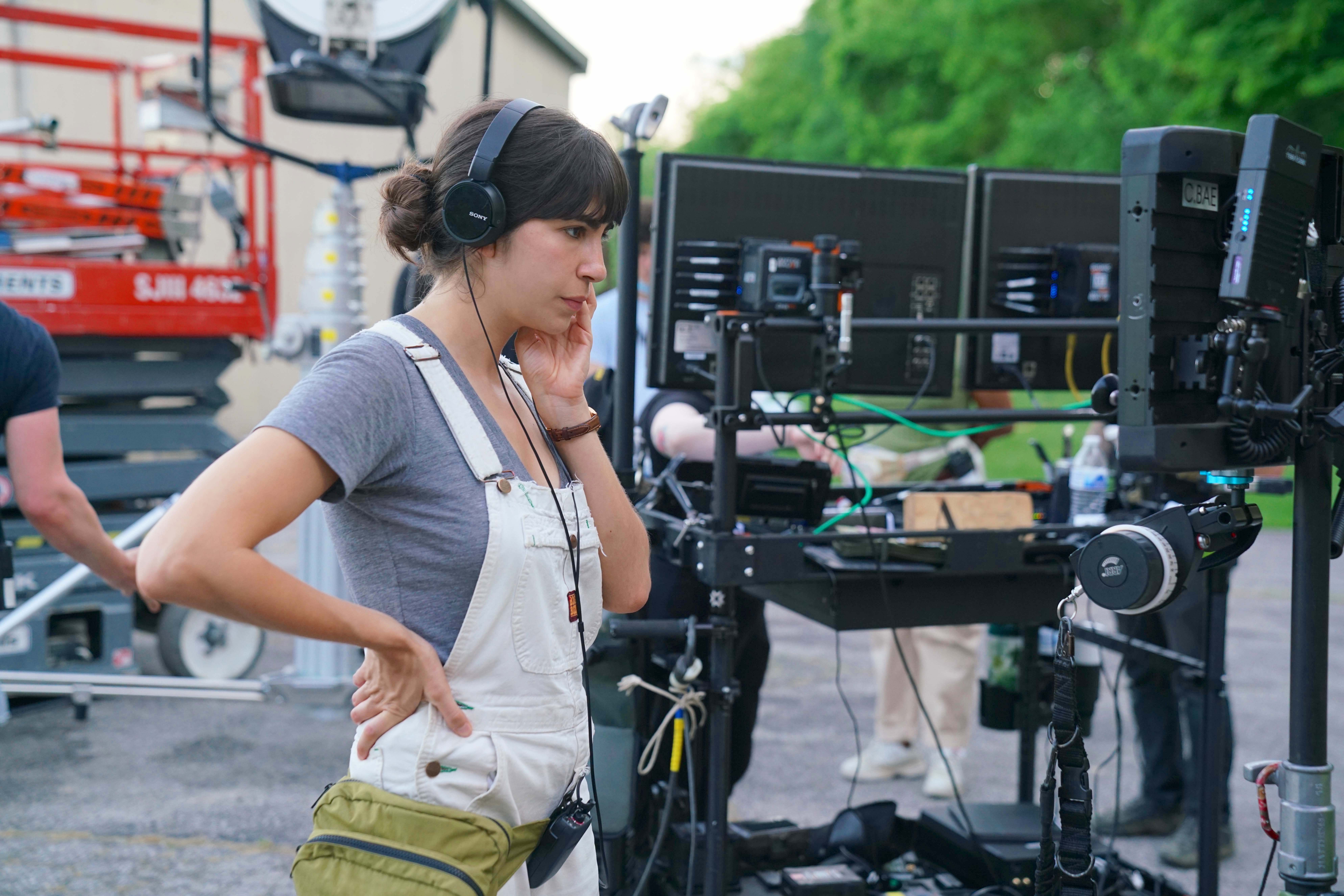
Laurel Parmet spoke with Solzy at the Movies about The Starling Girl, filming in Kentucky, and premiering the film at Sundance.
In the film, Jem Starling (Eliza Scanlen) is struggling with finding her place within the fundamentalist Christian community in her rural Kentucky town. She loves dancing with her church but worries that it might be a soon. Before show knows it, youth pastor Owen (Lewis Pullman) is back in town. Jem finds herself attracted to Owen and in a dangerous relationship. Parmet writes and directs while Scanlen, Lewis Pullman, Wrenn Schmidt, Austin Abrams, and Jimmi Simpson star.
The Starling Girl is currently playing in New York and Los Angeles theaters. Bleecker Street will expand the film starting on May 19. Check your local listings for details, No Kentucky playdates were listed as of May 19 despite filming on location in Kentucky.
It’s so nice to meet you. What was the genesis behind The Starling Girl?
Laurel Parmet: My personal connection to the film is I had a similar relationship when I was a teenager with an older man. I hesitate to call it a relationship even, I don’t know. Whatever it was. I didn’t see myself as a victim and I had a lot of agency in the relationship. After it ended, I had a lot of guilt about it, but I didn’t really excavate that. I just sort of pushed those feelings aside and didn’t think about it for a long time.
Years later, I was in Oklahoma, doing research for a different project and met a group of women from a patriarchal church and spent some time with them for this other project and learned about their beliefs. I learned that they believed that it was a woman’s responsibility to not lead a man into temptation and that basically, female women had to submit to men, and that female submission was ordained by G-d. When I first heard these beliefs, I was really taken aback. The more that I thought about it, the more that I realized we actually had in common, which I think is a very obvious statement but at the time was eye-opening to me, just in terms of the culture that I grew up in, and the attitudes that I was indoctrinated by, in terms of female sexuality, my attitude towards my own desires, and what was slutty behavior.
My time with them was this critical turning point for me because it made me reflect back on my own relationship in ways that I hadn’t before. It made me start to recognize this guilt that I had and ask myself like, well, where did this guilt come from? Why do I have this? He was taking advantage of me—where did these feelings come from? I decided that I wanted to make a film, looking back at my experiences, and looking at these really universal experiences for women, just in terms of sexual shame and seeking approval in men, and set it in this specific world, really, to reflect our own world.

How excited were you to premiere the film at the first Sundance in a few years in which the fest was truly back?
Laurel Parmet: It was amazing. It’s been a lifelong dream to have a film premiere at Sundance and it was so cool to screen the film in front of 400 people. It was a very reactive audience. There was laughing and there was screaming, crying, and cheering. I was on the edge of my seat the whole time being like, are they gonna hate it? Are they gonna like it. It was such a joy that it got such a positive response there, too—just to be in the company of so many other incredible filmmakers on top of it all. This film went through the Sundance Labs. We were a Sundance Institute-supported project. Just being a part of the Sundance family and having the film play there just was so incredible.
I was on the ground this year but ended up watching the film through the Apple TV app.
Laurel Parmet: Oh, cool.
It turned out to be a blessing in disguise because I recognized that stretch of Interstate 64.
Laurel Parmet: Oh, really?
I’m from Louisville!
Laurel Parmet: Oh, that’s amazing! You know what? Actually, I think we might have read that somewhere, maybe one of your recaps about the film.
Yeah.
Laurel Parmet: How did it feel seeing your city on screen?
Well, I immediately rewound, took a photo, and of course, did not post it online. It’s not often I see Louisville in a movie.
Laurel Parmet: I’m sure, yeah. Oh, yeah. We loved shooting there. It was such an amazing location and really super friendly people. And yeah, we loved it.
How helpful were the film commissions in Louisville and Kentucky in general?
Laurel Parmet: They were great. Their tax incentive—I know that they had it in the past, it went away, and they just brought it back. I think we were one of the earlier productions to take advantage of that. They were super helpful at the Film Commission, helping us navigate all of the legal red tape. And yeah, and all of the people—it’s a small film community in Louisville, but really warm and open and really helpful in terms of finding locations and crew. It was just a really positive experience.
(Zoom decided to freeze during this question.)
How did you decide on filming in Kentucky?
Laurel Parmet: It was a few factors. The tax incentive was a very big one. I also went to scout it and I just fell in love with the exteriors and the beauty. It’s so lush and green and all of the rolling hills. I wanted the film to have a very lush, verdant quality to it, sort of reflect what’s going on internally for Jem. Jem is experiencing a lot of messed up things, but she’s also experiencing this opening up that’s something that’s very beautiful, vivid, and intoxicating. I really wanted the locations in the world to reflect that. Kentucky just provided all of that and more.
Can you talk about directing the cast?
Laurel Parmet: It was honestly a dream. It was one of the best experiences I’ve ever had working with actors. They’re all really talented, lovely human beings—no divas, everyone was just there to do the work. Everyone was passionate about it.
With Lewis and Eliza, we had a week of rehearsals beforehand to go through all of the beats of the script and to really pinpoint their power dynamics, and where in the story we wanted Jem to have more power, where in the story we wanted Owen to have more power. We’re really walking this fine line of getting you invested in these characters and portraying a story where they’re falling in love, but at the same time, communicating to audiences, the problems with this relationship and their connection. It was really this fine dance and we had to be really delicate and purposeful. It was all very calculated. Figuring that out with the actors was really fun. That’s one of my favorite things to do, to craft those scenes where parts of the scene, you’re really rooting for Jem and Owen to be together and then a minute passes and later in the scene, you’re like, Oh, you’re repulsed and you don’t want them to be together in the film anymore. Taking the audience on that ride is so fun for me so yeah, I really enjoyed it.
Pandemic aside, what was the most challenging aspect of the production?
Laurel Parmet: I wouldn’t even say it was challenging. I just put a lot of effort into making sure that getting that balance in their relationship was making sure that I got that right. Making sure that Jem had agency and that she was a sexual being with desires and wants and getting the audience to be invested in their relationship while at the same time understanding that this relationship is problematic and not okay.
From a practical standpoint, it was a tight schedule. We were moving really quickly. We had a lot of really emotional scenes and not tons of time. The actors did wonderfully. The fact that we got to rehearse before production really helped.
Thank you so much. It was so nice to meet you.
Laurel Parmet: It was so nice to meet you. Thank you.
Bleecker Street released The Starling Girl in theaters on May 12, 2023.
Please subscribe to Solzy at the Movies on Substack.



